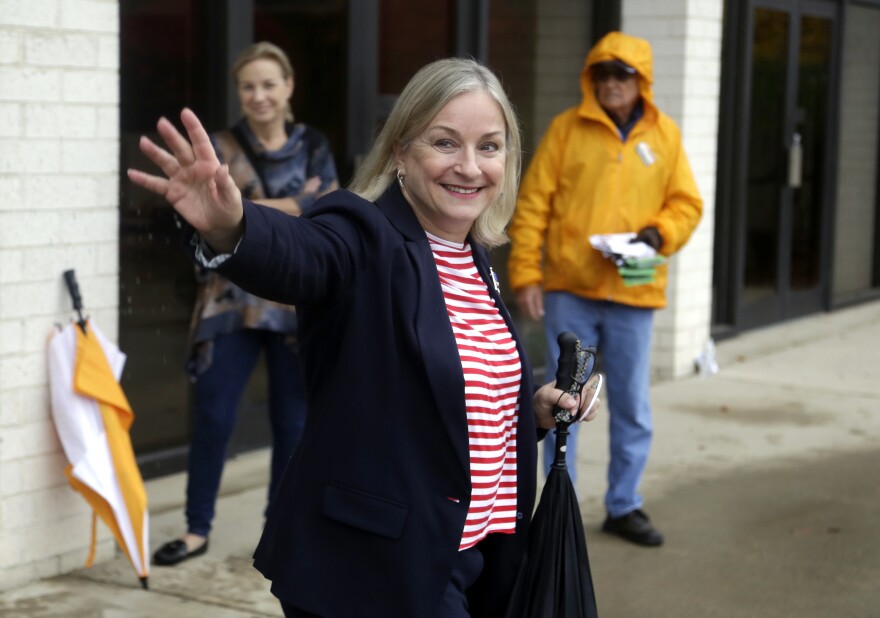WASHINGTON, D.C. — U.S. Rep. Susan Wild has found herself at the center of a raging national debate as Democrats rally around her proposal to safeguard in vitro fertilization procedures across the country.
Wild, D-Lehigh Valley, introduced the Access to Family Building Act last month to little fanfare. Her office didn't even immediately post a news release about the bill, which would guarantee access to assisted reproductive technology, such as IVF and other treatments, for people struggling to conceive.
But weeks later, the Alabama Supreme Court kicked a hornet's nest when it ruled embryos can be considered children under state law. As a result, hospitals and fertility clinics across the Yellowhammer State have halted IVF operations.
The treatment typically results in multiple embryos, some of which may be frozen for later use. But if patients decide they no longer want the embryos, hospitals would not be able to dispose of them without running afoul of abortion or child endangerment laws.
Even if the embryos aren't frozen, a doctor could face criminal liability if the embryo — now legally a person — fails to implant in a mother's uterus.
The decision also has created heartache for Alabama couples, many of whom have already paid substantial amounts for the treatment and undergone stressful procedures only for the process to abruptly end.
A year in the making
In an interview Thursday, Wild said she's been working on the bill since shortly after the U.S. Supreme Court struck down Roe v. Wade in 2022. While most people grappled with how the ruling would affect abortion rights, Wild said she honed in on Justice Clarence Thomas' concurring opinion. In it, Thomas said the court should revisit other issues that relied on similar legal logic, such as gay marriage and access to contraceptives.
"This was in my mind. I remember coming into the office and talking to my legislative team saying, 'I think we need to do a bill to codify the right to IVF,'" Wild said.
"For once in my life, my foresight was spot on," she added.
The bill's language has been in place for nearly a year, Wild said, but she spent months searching for a Republican willing to step up as a co-sponsor. While a handful expressed some interest, none of the members she approached was willing to put their name on it, she said. Wild said she finally introduced it without bipartisan support in January, after deciding it had lingered too long.
A growing chorus
Once on the register, the bill found support among fellow Democrats, including U.S. Sen. Tammy Duckworth, D-Ill., and one Republican — Rep. Anna Paulina Luna, R-Fla.
But the court ruling has changed the political calculus surrounding the bill and put Republicans in a difficult spot. Ten states already define life as beginning at conception, according to Politico, and conservatives such as Speaker Mike Johnson, R-La., have pushed for similar bills at the national level.
But those bills pose the same challenges to IVF, which polls show is widely popular with the American public. About 1 in 5 married American women struggles with infertility, according to the Centers for Disease Control and Prevention.
"The amount of public interest in this has been really extraordinary."U.S. Rep. Susan Wild, D-Lehigh Valley, on her bill that would guarantee access to IVF treatments
While Luna has withdrawn her support for the bill, saying her co-sponsorship was accidental, more Democrats have offered their support and sought to push it to higher prominence. In a news conference Thursday, several federal lawmakers shared their own stories about their difficult IVF experiences and the thought about families losing access to such care.
U.S. Rep. Lori Trahan, D-Mass., said after years of challenges and undergoing invasive surgeries and painful injections, IVF allowed her to become a mother twice.
"There are thousands of women in Alabama right now having that chance to have children ripped away from them," Trahan said.
Around the same time, Duckworth tried to force a vote on the Senate version of Wild's IVF measure, warning that other states will face the same issues as Alabama. The effort was stalled by Rep. Cindy Hyde-Smith, R-Miss., who defended the Alabama Supreme Court's ruling while also voicing support for IVF.
Ringing off the hook
Wild said her phone has been ringing off the hook since the court's ruling as Pennsylvanian's reach out to share their own stories about infertility and IVF.
Despite the unusual level of support, she isn't optimistic about the odds of the bill passing. The House has struggled with even basic functions such as funding the government and picking a speaker this session; reaching consensus on a controversial issue seems unlikely, she said. Still, she encouraged people to reach out to their lawmakers and be heard.
With so much up for grabs ahead of the November election, she said, it could be enough to sway people in the Capitol given the clear public opinion.
"I would be happily shocked if this gets to a vote this year," Wild said. "But you never know. The amount of public interest in this has been really extraordinary."
The Associated Press contributed to this report.


